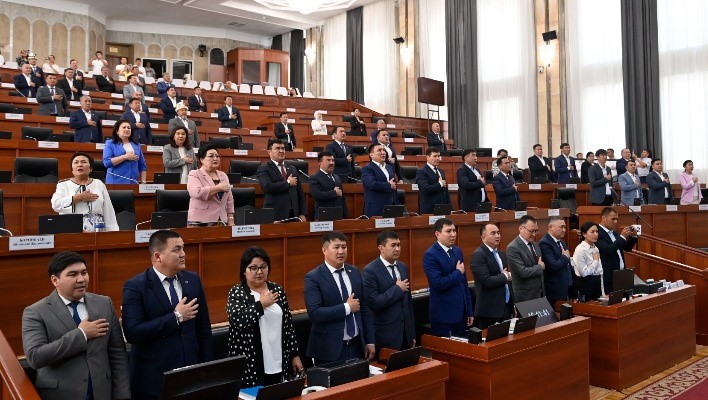Another electoral reform for Kyrgyzstan
In view of the 2026 elections, the only Central Asian country without a ruling dynasty is discussing a new change to the voting system. Each voter would be given the opportunity to choose three candidates in their constituency to ‘vote for people and not for parties’.
Bishkek (AsiaNews) - A group of Kyrgyzstan MPs has proposed further amendments to the ‘Žogorku Keneš elections’ law, which has been under discussion for some time, to radically change the country's electoral system. Now, instead of party and single-member seats, multi-member seats are proposed, according to party lists.
The electoral law has already been changed several times since the proclamation of independence of Kyrgyzstan; it was first a simple Code, then transformed into constitutional law, reflecting the political transformations and changes at the top of what had been defined as the ‘island of democracy’ of Central Asia, not having an unshakeable ruling dynasty like its neighbours.
From 1991 to 1999 a bicameral parliamentary system was in force, the Legislative Assembly and the Assembly of People's Representatives, where deputies were elected by a majority system in single-member constituencies.
The lower house had 35 members, the upper house 70, and the two houses had equal rights, unlike in the rest of the world. In 1998 it was decided to increase the number to 105, 60 in the first and 45 in the second, while in 2005 the parliament was reduced to the single chamber of Žogorku Keneš, and in 2007 the choice of the party system was introduced, introducing a rule that guaranteed a 30% quota for women, which was never respected.
In 2010, the system changed to proportional representation, with a 5% barrier for parties to obtain seats, and then in 2017 the requirements for parties and candidates were tightened, including the introduction of biometric data for voters.
In 2021, after the clashes in 2020 that led to the presidency of Sadyr Žaparov, a referendum was held for the new constitution, also changing the electoral law, whereby the parliament is elected using a mixed system of proportional and majority representation, with a 3% threshold, respecting gender quotas on party lists.
The changes have always been modelled on the new political realities that have formed after various tensions and conflicts in the country, polarising the influence of the major parties and groups with opposing political ideologies.
Now a completely new variant is being proposed, and it remains to be seen what effects it will have on the political life of Kyrgyzstan. According to the MP Dastan Bekešev, one of the co-authors of the new law interviewed by Radio Azattyk, ‘in parliament all we do is talk about elections, even though they won't be held until 2026, probably in September-October, but we're preparing for them right now’.
Now each voter will have the chance to choose three candidates in their constituency, at least one of whom must be a woman, and parties can only present one candidate for each seat; independents will try to form lists together with parties to form groups of three candidates who campaign together, to increase their chances of being elected.
If an MP leaves his seat during his term of office for whatever reason, the first of those not elected in his constituency will be appointed in his place. Proponents of the changes emphasise the importance of ‘voters being able to vote for individuals, not parties’. We can expect a very lively electoral campaign, in which the candidates will be the real protagonists, and not just party emissaries destined to obey orders from above.
According to Atyr Abdrakhmatov, former Commissioner for the Defence of Rights in Kyrgyzstan and member of the Electoral Commission, ‘it is important to leave all the time necessary to adequately prepare for the next elections’, resisting the temptation to hold them early in 2025, ‘for which the budget funding has not even been allocated’.
The change was necessary, according to many, because ‘the party system in Kyrgyzstan doesn't work’ and only leads to the formation of power groups destined to clash dramatically for the population.
Often the politicians themselves have changed party affiliation just to remain in power, while today the Kyrgyz hope to see a new generation of young people, women, disabled or middle-level workers in parliament, to give the people the chance to really participate in the government of the country.







.png)










